An estimated thousand guests attend German National Day reception
By Publisher Lee Kyung-sik with Reporter Sua Kim
Many Koreans consider Germany as a teacher, a good teacher, from whom, the Korean people on both sides of the Demilitarized Zone could learn much to achieve their own reunification, peaceful reunification of the Korean peninsula divided into the north and south since 1945 when the World War II ended.
This became clear again at the Day of German Unity reception hosted by Ambassador Stephan Auer and Mrs. Vera Auer, who hosted an extra-gala reception at the Grand Hyatt Hotel in Seoul on Oct. 5, 2018.”
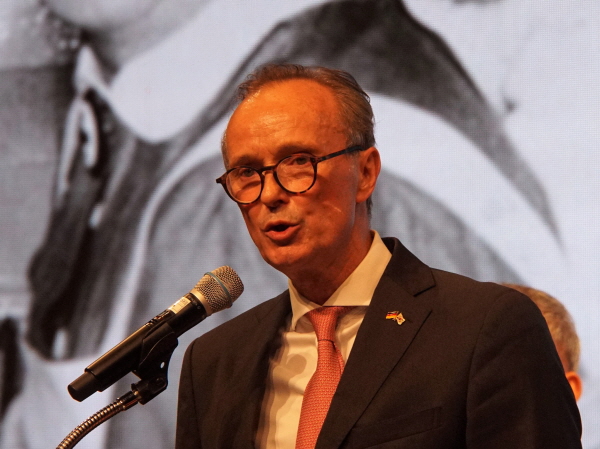
Speaking to the guests in celebration of the National Day of Germany, Ambassador Auer said in part, “I have already had intensive debates with Minister Kim Pan-Suk of Personnel Management and other Korean government officials about our experiences with German unity, the lessons of which he--adapted to the Korean situation--would like to implement in his ministry’s policy planning.
On this point, Minister Kim said, “Ambassador Auer and I have had lengthy discussions on German reunification as well as peace on the Korean Peninsula, and I was impressed by his remarks that key to the German reunification was the German people's willingness for unity and their aspiration for peace and prosperity. ”
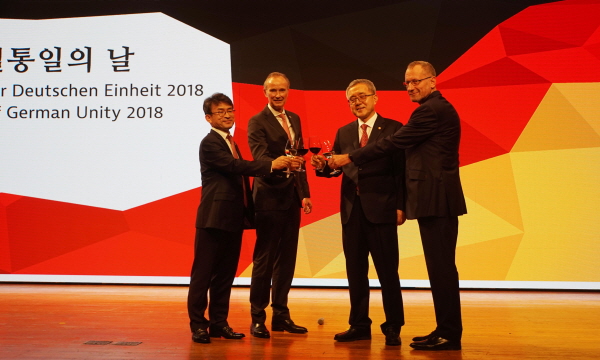
However, many of the Korean guests attending the party, especially the busienss people, would have preferred more to hear the remarks by made by CEO Jurgen Friedich of German Trade and Investment, who said: “There are Korean companies already all around our country, enjoying the position within Europe’s leading economy and the access to the huge EU market it provides. In fact, Germany is the most popular destination for Korean subsidiaries within the entire EU, and there are many German companies here too, enjoying what a healthy mutual relationship is.”
Diplomatic relations between Korea and Germany, in fact, date back to 1883 when Korea and Germany when the governments of the two countries signed a Friendship and Trade Pact. The formal diplomatic relations did not last long due to continued influence exerted on the country from Japan and the eventual annexation of Korea to Japan in 1910.
Diplomatic relations between the two countries resumed in 1955 and thenceforth the two countries increased contact and cooperation in many different fields.
Germany is the largest trading partner of Korea in Europe with their volume of trade reaching US$27.4 billion in 2017. German investments in Korea totaled US$13.26 billion in 2017, which is the third largest from a European country.
Korea and Germany continue to increase their cooperation in various fields, especially in the area of fourth industrial revolution, new renewable energy, occupational training, development of small-medium industries and the information-technology fields.
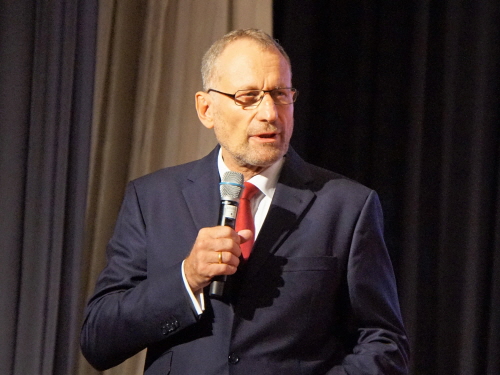
Korea is one of the member countries with the Germany in the G20 and the OECD. The two countries are also cooperating closely with each other in various other fields, including promotion of human rights, climatic change control, and maintenance and peace and stability in the world.
There are many Koreans actively contributing to strengthening the bridge of friendship and cooperation between the two countries, including Composer Isang Yun and Writer Mirok Li. There are many Korean artists following their suit in Germany contributing to the construction and reinforcement of the already firm cultural bridge spanning Korea and Germany.
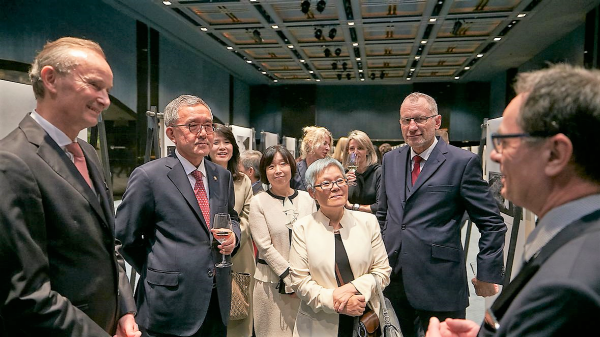
It was one of the largest National Day functions hosted by the Ambassadors in Seoul. The partitions between two ballrooms were removed to turn into one huge hall the main Grand Ball Room, the Regency Ballroom and the large space between them. Reporters attending the function from The Korea Post media estimated the guests to total more than a thousand.
Attending the reception, besides Minister Kim were many distinguished guests from Korean society as well as from the international community in Korea. Among them were CEO Max Burger of Man Group Korea, CFO Bernd Gehlen of BASF, General Manager Berhard Brender of the Grand Hilton Hotel Seoul, Standing Commissioner Jung Sang-hwan of National Human Rights Commission of Korea, and Publisher-Chairman Lee Kyung-sik of The Korea Post which, established 33 years ago in 1985, now owns and operates 3 English and 2 Korean-language news media outlets. Excerpts from the speech of the Ambassador, the Minister and the Chairman of the German Trade and Investment Organization follow:
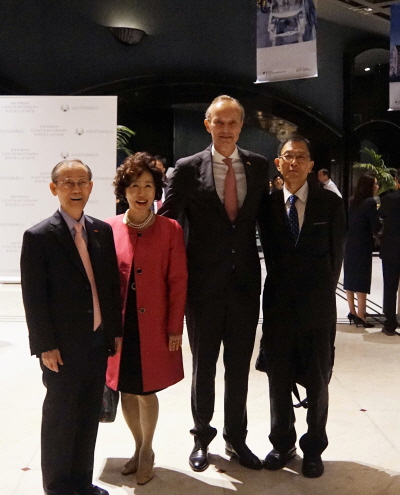
Excerpts from the speech of Ambassador Auer of Germany:
We have had an eventful and dynamic year in many respects. This applies to the rapid developments in international politics, but even more so to the Korean peninsula in 2018. And also in Korean-German relations, one important event followed the next.
With great pleasure I look back at the Olympic Games in Pyeongchang--not only because they were particularly successful for the German Team. But also because sport has facilitated dialogue between South and North Korea, and this dialogue has been intensified ever since. As a reunited country celebrating the 28th anniversary of German unification, Germany is looking with particular interest at the Korean peninsula. People in Germany feel for the Koreans. We see Korea as an important value partner and essential ally in our “alliance for multilateralism”. This is also reflected in the increased number of political visits: President Steinmeier and Minister of the Interior De Maizière visited Seoul and Pyeongchang for the Olympic Games last February, and at the end of July, Foreign Minister Maas paid a visit to Korea.
You can see from the quantity and rank of these visitors that our bilateral relations are lively and cover many areas. Germans and Koreans work together on innovation and research, trade and invest in the other country, make music and play sports together – such as the many Korean soccer players who moved to Germany after their deserved 2:0 win at the World Cup. I am sure you understand that I prefer not to speak about football any more this evening.
All joking aside, not only the impressive match of the Korean football team against Germany has shown how Koreans can excel themselves. I am deeply impressed by the Korean discipline and pursuit of competitiveness and success. Thus I feel all the more happy that Korean-German relations are this good.
One event over the course of the last months that has reassured me of the excellent relations between our two countries was the recognition of Germany as a “Medical Support Nation”. Still during the Korean War, the Federal Republic of Germany had promised South Korea humanitarian medical support, which arrived in the form of doctors, nurses and medical supplies by 1954. Through this decision, the Korean government is today, in retrospect, paying tribute to Germany’s important medical aid, which reached about 300,000 South Koreans.
This example is representative for many others and makes very clear: Germans and Koreans share the same interests and values and can count on each other. Together we are stronger and have better chances of reaching our goals. We fight together for the preservation and strengthening of our rules-based, multilateral world order as well as for free world trade. We must combat climate change and environmental pollution together. The alliance for multilateralism needs strong team players to secure peace and prosperity around the world, and Korea is an important pillar in the alliance announced by Foreign Minister Maas.
Cooperations and possibilities for further collaboration between our two countries are manyfold. A good opportunity to discuss these is by taking a look at the magnificent exhibition “German Contemporary Excellence” by Gerhard Steidl and the Meisterkreis here in the Grand Salon. Jim Rakete’s pictures aesthetically play with German products. They provide an impulse for discussions about the complementarity of our economies and companies, but also about culture, design and innovation. I am happy that Gerhard Steidl himself could join us here today.
Let me come to an end: I am glad that so many of you have come tonight to celebrate German reunification. And from the bottom of my heart I wish for our Korean guests that you will be able to celebrate Korean unity in peace and freedom in the not too distant future.
Now, I am particularly pleased to be able to introduce to you our Guest of Honor: His Excellency Kim Pan-Suk, the Minister of Personnel Management. Minister Kim is a friend of Germany and very interested in German reunification. I have already had intensive debates with him and his colleagues about our experiences with German unity, the lessons of which he – adapted to the Korean situation – would like to implement in his ministry’s policy planning. Thank you very much for being with us today, Your Excellency!
Excerpts from the speech of Minister Kim Pan-suk of Personnel Management:
Good evening, distinguished guests, ladies and gentlemen. I am deeply honored to represent the Republic of Korea at this significant occasion celebrating the Day of German Unity, Tag der Deutschen Einheit.
I would like thank Ambassador Stephan Auer for the kind invitation. I am also grateful for Dr. Jürgen Friedrich, Chairman and CEO of Germany Trade & Invest, and the many special guests joining us tonight.
I am pleased to say that the Republic of Korea has very special ties with Germany. This year, our two countries celebrate 135 years of diplomatic relations. The miracle on the Rhine inspired us to dream of the miracle on the Han River.
With over 28 billion dollars of trade in 2017, Germany is our largest trade partner in Europe, and home to approximately 40,000 Korean compatriots. Up to the year 2017, Allianz, BASF and many other renowned German businesses have invested a total of 13.2 billion dollars in Korea, showing the vibrant economic partnership between Seoul and Berlin. I am hopeful that this partnership of mutual benefit between our two nations will continue across the areas of economy, culture, sports, and others.
On August 15th, “Ode to Joy”, the final movement of Beethoven's 9th Symphony, was performed at the Korean national ceremony commemorating our 73rd Liberation Day. As you are well aware, this piece, with its message of joy, peace and affection for all humanity, also resounded at Brandenburg Gate square and the Reichstag on October 3rd, 1990, as East and West Germany declared their unification. It was selected this year for the Liberation Day ceremony in the hope for lasting peace on the Korean Peninsula.
Listening to “Ode to Joy” at the ceremony, I recalled the falling of the Berlin Wall in November 1989 and the Declaration of German Reunification on October 3rd the following year in front of the Brandenburg Gate. I could imagine the joy and hope that the German people must have felt when the Brandenburg Gate at the border dividing Berlin became a symbol of peace.
The Korean Peninsula has remained under an Armistice and military tensions often escalated until the end of last year. However, as you know, in early 2018, a bold step has been taking place on the Peninsula to put an end to confrontation and usher in a new inter-Korean era of peace and prosperity.
It started with the PyeongChang Winter Olympic Games, also known as the Peace Olympics, which led to the Panmunjeom Inter-Korean Summit. For the first time in history, the North Korean leader stepped across the demarcation line. Then, on Singapore’s Sentosa Island, the historic summit between Pyongyang and Washington took place. And last month, the national leaders of South and North Korea met in Pyongyang for another inter-Korean summit and had an incredible historical tour to Paektu Mountain and Heaven Lake.
On September 27th, President Moon Jae-in emphasized in his speech to the 73rd United Nations General Assembly his expectations for bold measures toward denuclearization and a declaration of the end of the war and called for the support of the international community. He also expressed Seoul's commitment to support Pyongyang's effort to end its prolonged isolation and reach out to the world again.
At this critical moment that will determine the fate of the Peninsula, the German experience of reunification serves as a precious lesson for us. Despite some issues unique to either Korea or Germany, the Eastern policy, the gradual expansion of exchanges between East and West Germany, the mitigation of social conflicts and economic challenges caused by reunification, and other experiences of Germany offer us an inspirational model from which to learn.
Ambassador Stephan Auer and I have had lengthy discussions on German reunification as well as peace on the Korean Peninsula. I was impressed by his remark that the key to German reunification was the German people's willingness for unity and their aspiration for peace and prosperity.
While military and diplomatic efforts are important, I believe that sharing our thoughts and learning to embrace our differences will be what brings peace to the Korean Peninsula and settles it more firmly. I don’t know how many of you like cold noodle (naeng-myun) and, surprisingly, the inter-Korean summit at Panmunjeom caused the popularity of Pyongyang-style cold noodles to explode. North Korean people waved their hands to the songs of K-pop stars from the South. It might take time, but I am confident that the two Koreas will get closer to each other by increasing exchanges.
The government of the Republic of Korea is also calmly preparing to handle complex issues as inter-Korean relations move forward. Accordingly, a number of government agencies are preparing for a new development. Currently, the Ministry of Personnel Management is operating a training course for high-level government officials at the Free University of Berlin, while also conducting research on how to provide proper capacity-building programs for North Korean public officials in preparation for future inter-Korean exchanges, with related German experiences as important reference points.
The united Germany has become the vibrant heart of the European Union and the growth engine of the entire continent. Learning from the European Union case, President Moon Jae-in has proposed an East Asian railway community, inspired by the European Coal and Steel Community, a precursor to the current European Union. I am hopeful that Korea will become the Germany of East Asia to pave the way toward the East Asian economic community and multilateral peace and security regime.
Therefore, I count on the support and encouragement of Germany as we move forward toward these goals. For many reasons, I am really exciting to congratulate the German day of unity.
Once again, I appreciate Ambassador Auer’s kind invitation and also many thanks go to all the distinguished guests for the warm reception at this honorable occasion.
Excerpts from the speech of CEO Jurgen Friedich of German Trade and Invest:
Your excellency, Ladies and gentlemen, Germany Works. This is a phrase specifically chosen to represent our country as it has many different meanings, all of which are as pertinent as they are true. But rather than function as a dictionary to explain it to you all, my company, Germany Trade & Invest, has produced a short film to tell you all about it.
Germany is a place to which all business are welcome and many foreign businesses from all over the world thrive.
There are Korean companies already all around our country, enjoying the position within Europe’s leading economy and the access to the huge EU market it provides – in fact, Germany is the most popular destination for Korean subsidiaries within the entire EU. And there are many German companies here too, enjoying what is a healthy mutual relationship.
Ray Co. Ltd. is one excellent recent example of a Korean company setting up their European HQ in Germany with the support of GTAI. Ray is a global and cutting-edge x-ray imaging solutions provider and is growing their European business successfully out of the Frankfurt region. A special welcome in that sense to Mr. Hyungjoon Cho from Ray who has joined us here tonight, as well as many others who have worked together with us over the past few years.
I could talk about this at length, but I appreciate you are all hungry (I know I am) and the buffet awaits.
However, myself and my team--Achim Hartig, Managing Director Investor Consulting, Heiko Staubitz, Senior Manager Smart Grids and Energy Storage, Alex Hirschle, Director of our office here in Seoul and his colleague Hee-Kyoung Lim, and Madeleine Tischer, Senior Manager Marketing--are all here to talk to and we look forward to meeting you all through the course of the evening.

